
The Heart of European Diplomacy: European Quarter in Strasbourg
Nestled in the vibrant city of Strasbourg, the European Quarter is a testament to Europe’s pursuit of unity and cooperation. This dynamic neighborhood is home to a plethora of key institutions, including the European Parliament, the Council of Europe, and the European Court of Human Rights. Visitors can marvel at the striking architectural designs that house these important bodies, with the Louise Weiss Building standing out as a modern marvel. The European Quarter isn’t just about politics and governance; it also offers a rich cultural experience. The Parc de l'Orangerie, a sprawling park with beautiful gardens, a lake, and even a small zoo, provides a perfect spot for a leisurely stroll or a relaxing picnic. Nearby, the Palace of Europe invites you to delve deeper into the workings of the Council of Europe, with guided tours available for those interested in learning more about its role and functions. For history enthusiasts, the European Quarter offers a poignant journey through Europe’s post-war history. The European Museum, situated within the quarter, provides a comprehensive overview of the continent's path towards integration. Through engaging exhibits and interactive displays, visitors can gain a deeper understanding of the milestones that have shaped modern Europe.
Local tips in European Quarter
- Visit the European Parliament during plenary sessions for a chance to witness live debates.
- Take a guided tour of the Palace of Europe to understand the workings of the Council of Europe.
- Spend a relaxing afternoon at Parc de l'Orangerie, especially in spring when the flowers are in full bloom.
- Check the European Museum’s schedule for special exhibitions and events.
- Wear comfortable shoes – the best way to explore the European Quarter is on foot.
The Heart of European Diplomacy: European Quarter in Strasbourg
Nestled in the vibrant city of Strasbourg, the European Quarter is a testament to Europe’s pursuit of unity and cooperation. This dynamic neighborhood is home to a plethora of key institutions, including the European Parliament, the Council of Europe, and the European Court of Human Rights. Visitors can marvel at the striking architectural designs that house these important bodies, with the Louise Weiss Building standing out as a modern marvel. The European Quarter isn’t just about politics and governance; it also offers a rich cultural experience. The Parc de l'Orangerie, a sprawling park with beautiful gardens, a lake, and even a small zoo, provides a perfect spot for a leisurely stroll or a relaxing picnic. Nearby, the Palace of Europe invites you to delve deeper into the workings of the Council of Europe, with guided tours available for those interested in learning more about its role and functions. For history enthusiasts, the European Quarter offers a poignant journey through Europe’s post-war history. The European Museum, situated within the quarter, provides a comprehensive overview of the continent's path towards integration. Through engaging exhibits and interactive displays, visitors can gain a deeper understanding of the milestones that have shaped modern Europe.
Iconic landmarks you can’t miss
Cathédrale Notre-Dame-de-Strasbourg
Explore the Cathédrale Notre-Dame-de-Strasbourg: A Gothic jewel showcasing stunning architecture and rich history in the heart of Strasbourg.
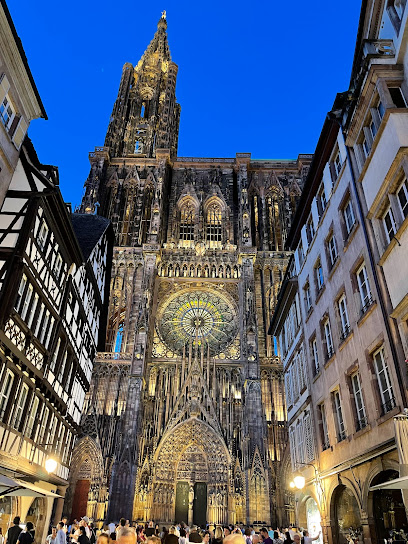
Parc de l'Orangerie
Explore the serene beauty of Parc de l'Orangerie in Strasbourg, a city park offering lush gardens, a tranquil lake, and family-friendly attractions.
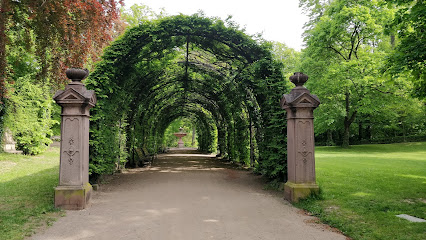
Barrage Vauban
Explore the Barrage Vauban in Strasbourg, a stunning historical landmark offering breathtaking views and a glimpse into the city's military past.
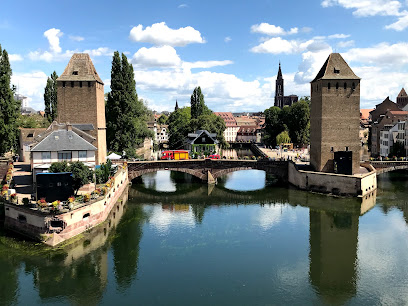
La Petite France
Discover the historical charm of La Petite France in Strasbourg, where picturesque canals and half-timbered houses create an unforgettable experience.
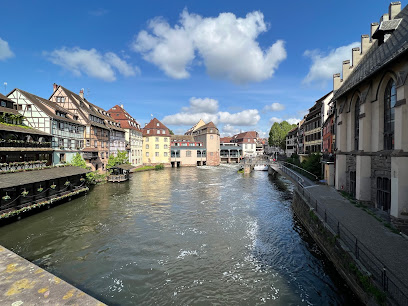
Strasbourg Covered Bridges
Discover the enchanting Strasbourg Covered Bridges, a historic marvel blending stunning architecture with scenic views in the heart of the city.
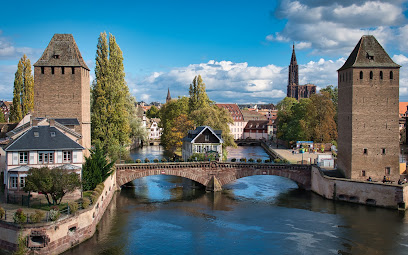
Historical Museum of the City of Strasbourg
Discover Strasbourg's rich heritage at the Historical Museum, where history comes alive through engaging exhibits and fascinating stories.
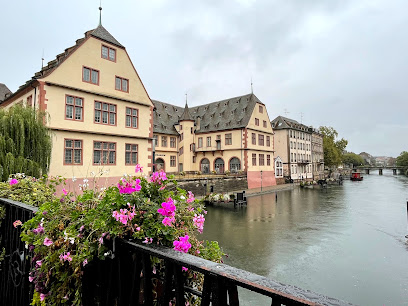
European Parliament
Discover the European Parliament in Strasbourg, a stunning architectural marvel at the heart of EU democracy with interactive exhibits and guided tours.
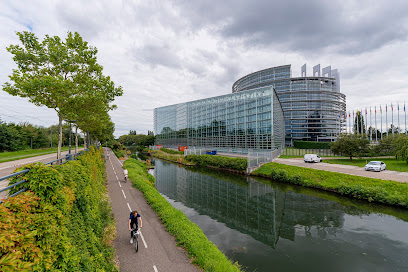
Grande-Île de Strasbourg
Explore the Grande-Île of Strasbourg, a UNESCO World Heritage site filled with stunning architecture, picturesque canals, and rich cultural experiences.
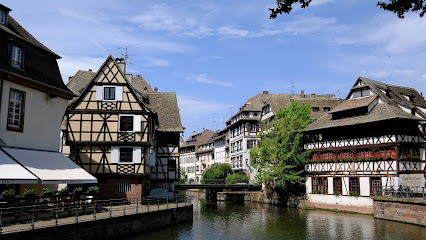
Place du Château
Discover the historical charm of Place du Château, a vibrant square in Strasbourg surrounded by iconic landmarks and rich cultural heritage.
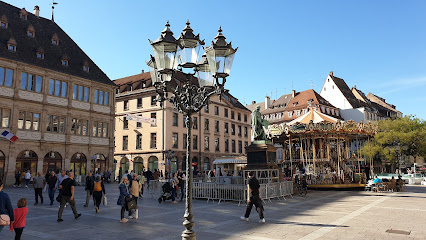
Citadines Apart'hotel Kléber Strasbourg
Discover the perfect blend of comfort and city life at Citadines Apart'hotel Kléber in the heart of Strasbourg, offering modern amenities and easy access to iconic attractions.

Statue du Général Kléber
Explore the iconic Statue of General Kléber in Strasbourg, a symbol of history and resilience, surrounded by vibrant culture and lively squares.
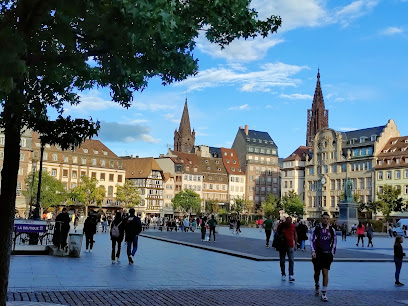
Statue de Johannes Gutenberg
Explore the Statue de Johannes Gutenberg in Strasbourg, a stunning tribute to the inventor of the printing press, located in a vibrant square filled with history.
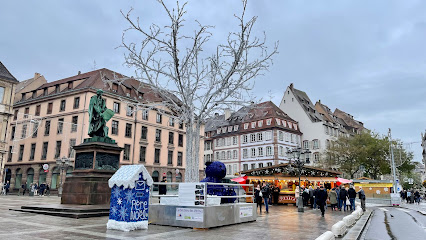
Palace of Europe
Explore the Palace of Europe, a striking architectural gem in Strasbourg symbolizing international unity and the heart of European governance.
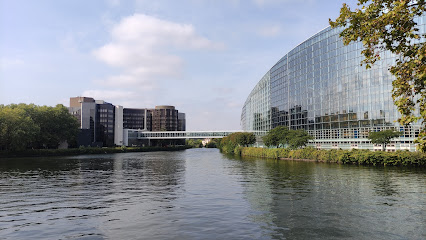
Unmissable attractions to see
Cathédrale Notre-Dame-de-Strasbourg
Experience the grandeur of Gothic architecture at Strasbourg's iconic cathedral, a historical and artistic masterpiece in the heart of Alsace.
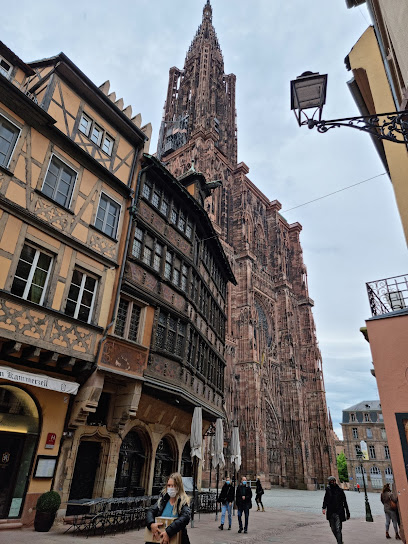
Place Kléber
Experience the heart of Strasbourg at Place Kléber: history, culture, shopping, and events converge in this central square.
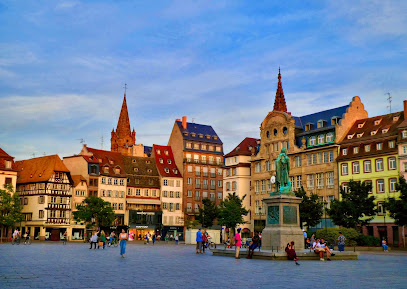
Parc de la Citadelle
Explore Strasbourg's Parc de la Citadelle: Where history, nature, and recreation meet in a vibrant urban oasis.
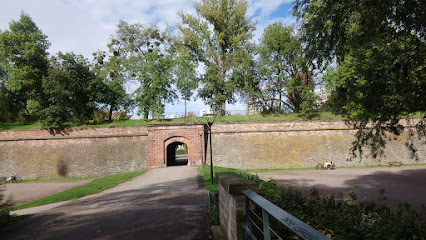
Alsatian Museum
Discover traditional Alsatian life through reconstructed homes and historical artifacts in the heart of Strasbourg.

Ponts Couverts de Strasbourg
Explore Strasbourg's medieval history at the Ponts Couverts, a picturesque reminder of the city's fortified past.
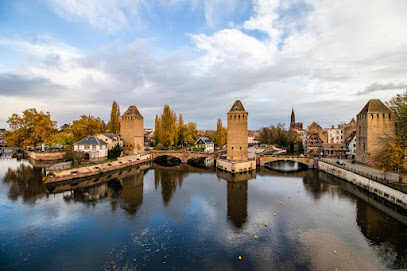
Grande-Île de Strasbourg
Explore Strasbourg's Grande-Île, a UNESCO World Heritage site with medieval charm, Franco-German influences, and stunning architecture.
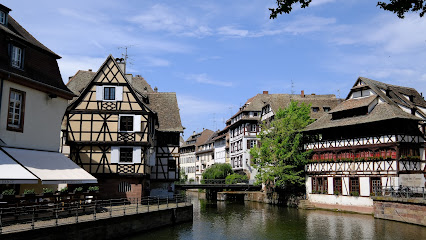
Place du Château
Discover Place du Château in Strasbourg: a historic square where stunning architecture meets vibrant culture and Alsatian charm.
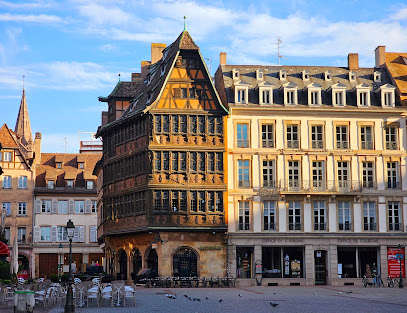
L'arbre bleue des Vitrines
Discover Strasbourg's playful side at L'arbre bleue des Vitrines, a creative and colorful landmark in the historic Place Gutenberg.
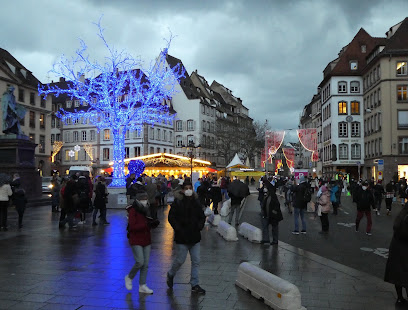
EUROPA-Quest
Explore Strasbourg's European district with EUROPA-Quest: An interactive game uncovering the Council of Europe's buildings and mission.
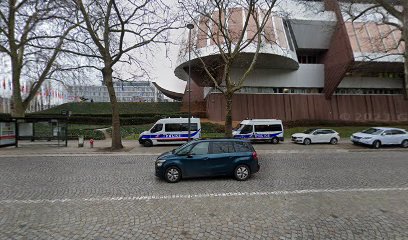
Essential places to dine
Le Gruber
Experience authentic Alsatian cuisine at Le Gruber in Strasbourg - a culinary gem blending tradition with modern flair.
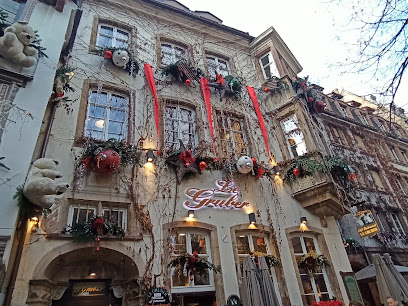
Restaurant Gurtlerhoft
Experience authentic French and Alsatian cuisine at Restaurant Gurtlerhoft in Strasbourg's charming city center.
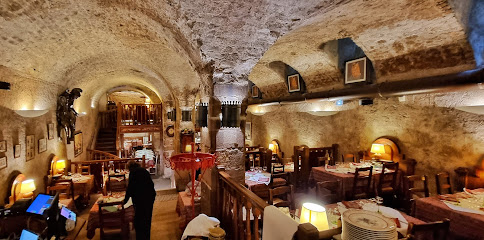
Restaurant Alsacien Strasbourg Schnockeloch
Experience authentic Alsatian cuisine at Schnockeloch in Strasbourg – where tradition meets flavor in a cozy setting.
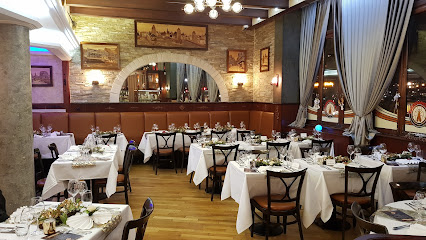
Chez l’Oncle Freddy
Discover authentic Alsatian cuisine at Chez l’Oncle Freddy in Strasbourg – where every dish tells a story of tradition and flavor.
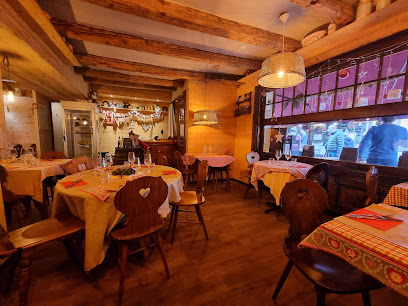
Restaurant Le Kuhn
Experience exquisite French and Mediterranean cuisine at Restaurant Le Kuhn in Strasbourg—where every meal is a celebration of flavor.
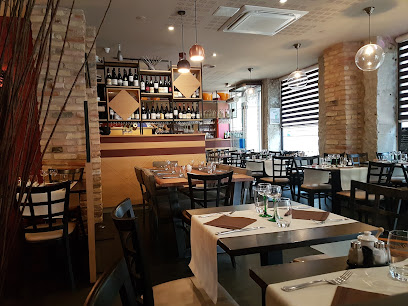
Au Vieux Strasbourg
Experience authentic Alsatian cuisine at Au Vieux Strasbourg - where tradition meets taste in a charming setting.
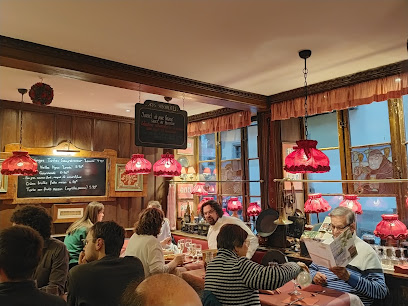
House of Tanners Restaurant
Discover the exquisite flavors of France at House of Tanners Restaurant in Strasbourg – where tradition meets culinary excellence.
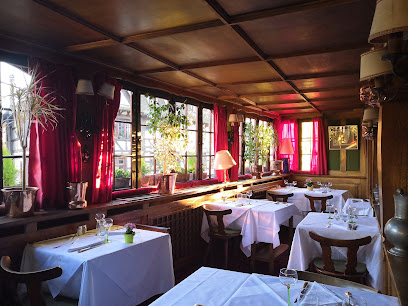
L'Oignon
Experience exquisite French dining at L'Oignon in Strasbourg – where culinary artistry meets warm hospitality.
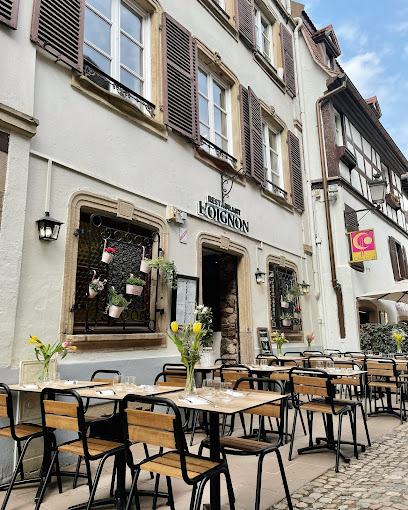
Au Crocodile
Experience exquisite French cuisine at Au Crocodile, Strasbourg's premier fine dining destination known for its elegance and culinary artistry.
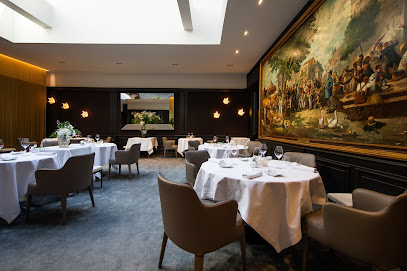
Santa Elena
Discover the vibrant tastes of Latin America at Santa Elena in Strasbourg – where every dish tells a story.
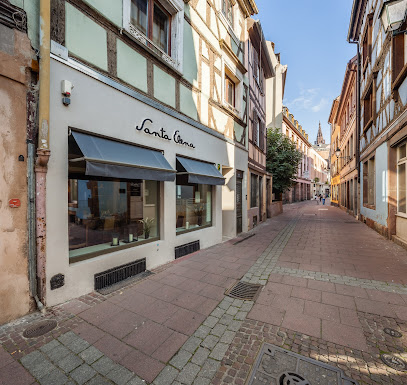
Markets, malls and hidden boutiques
Place des Halles
Discover Place des Halles: Strasbourg's premier shopping destination with diverse shops and delightful dining options that celebrate local culture.
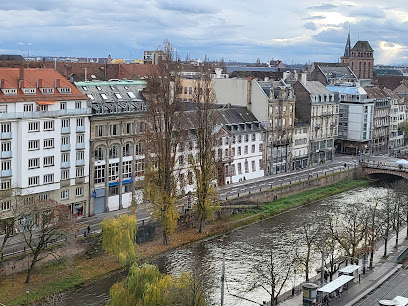
Galeries Lafayette Strasbourg
Experience the elegance of Galeries Lafayette Strasbourg, a premier shopping destination offering fashion, beauty, and gourmet delights in a stunning setting.
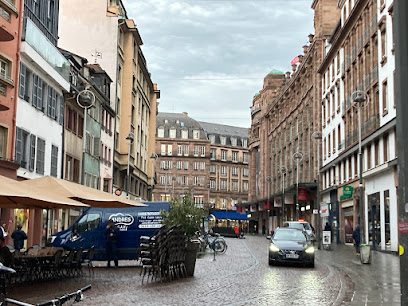
L'Aubette
Discover L'Aubette, a vibrant shopping mall in Strasbourg offering diverse shops and delightful dining experiences in a lively atmosphere.
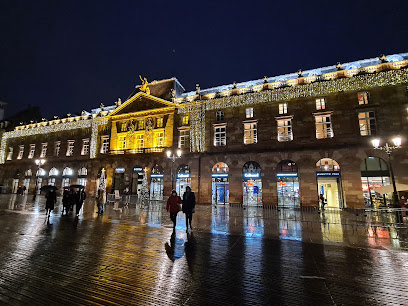
Christmas in Alsace
Experience the magic of Christmas in Alsace with festive markets, local crafts, and delightful seasonal treats in the heart of Strasbourg.
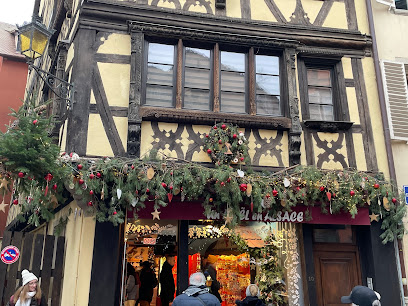
SEX SHOP LOVE STORE
Discover the enchanting Love Store in Strasbourg, where sensuality meets entertainment with an exquisite range of lingerie and adult films.
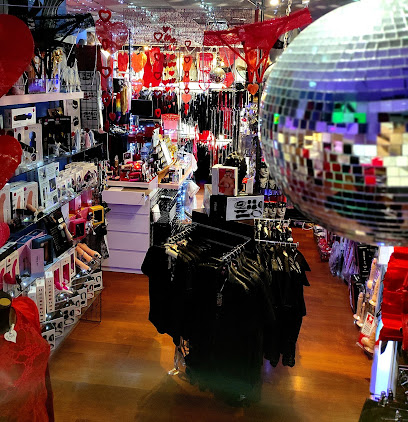
United Legend
Explore contemporary fashion at United Legend, a vibrant clothing store in the heart of Strasbourg, where local style meets modern trends.
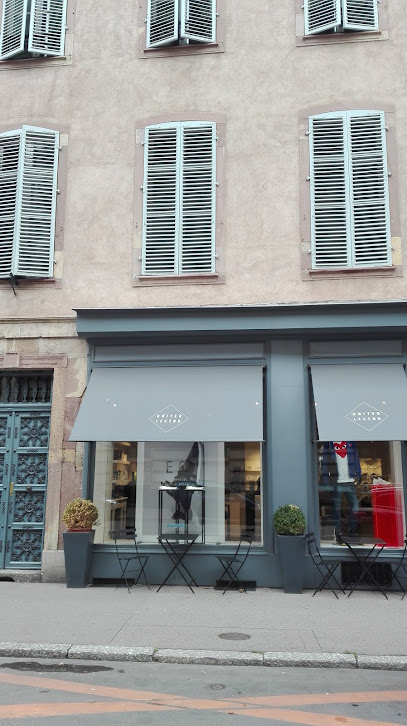
Le Coin d'Alsace
Explore the heart of Alsace at Le Coin d'Alsace, a home goods store filled with unique local treasures and gifts.
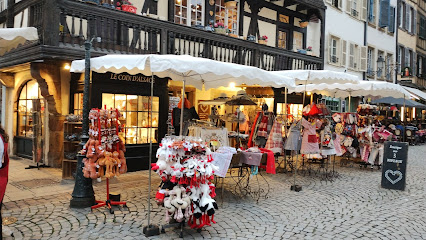
Little Nuage
Explore Little Nuage, Strasbourg's enchanting gift shop filled with handmade crafts, costume jewelry, and local artistry.
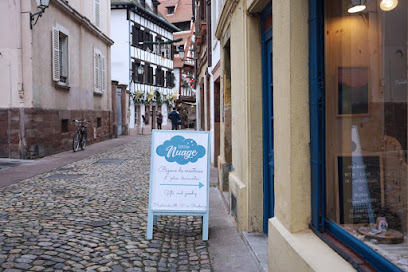
Plaisirs d'Alsace
Explore Plaisirs d'Alsace: A treasure trove of handcrafted gifts and unique souvenirs reflecting the vibrant culture of Strasbourg.
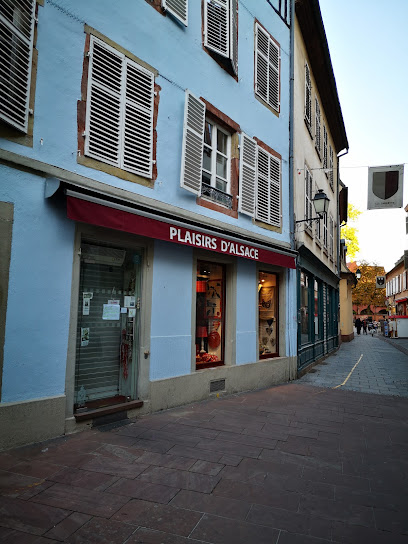
Marie-Rose
Explore the exquisite Marie-Rose Boutique in Strasbourg for unique women's fashion that embodies French elegance and style.
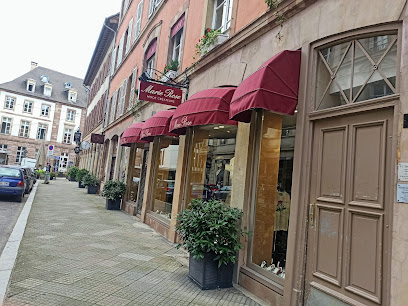
Essential bars & hidden hideouts
Les Berthom
Experience the charm of Strasbourg at Les Berthom, a cozy bar offering a diverse drink menu and a welcoming atmosphere, perfect for relaxation and socializing.
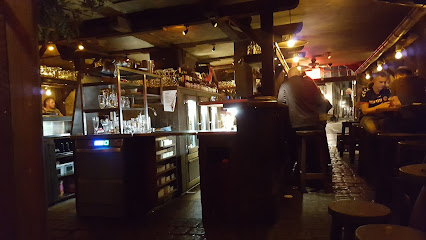
Le Grincheux
Discover the cozy charm of Le Grincheux, a delightful bar in Strasbourg offering local drinks and snacks in a warm atmosphere.
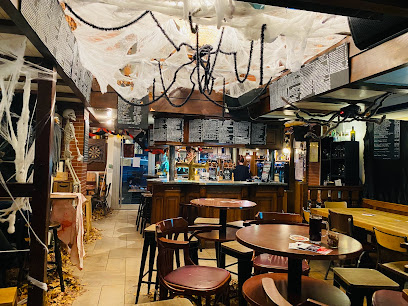
What the Fox
Explore the vibrant nightlife of Strasbourg at What the Fox, a trendy bar offering a diverse drink selection and a lively atmosphere.
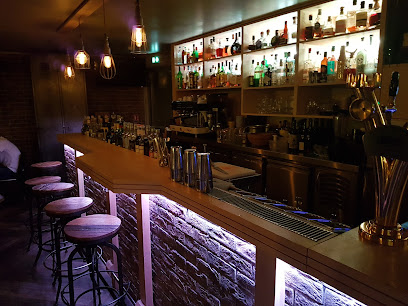
Code Bar
Experience the vibrant nightlife at Code Bar in Strasbourg, where expertly crafted cocktails meet a lively atmosphere, perfect for an unforgettable night out.
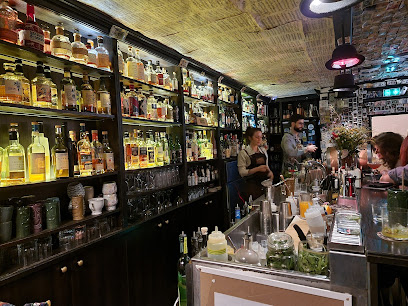
Kitsch'n Bar
Discover Kitsch'n Bar, a lively cafe and bar in Strasbourg offering delicious food, creative cocktails, and a welcoming atmosphere for all visitors.
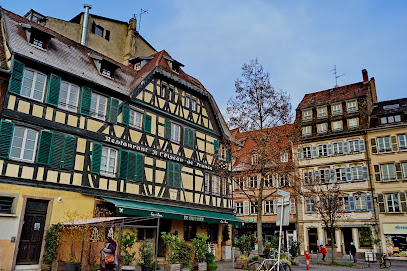
Le Douanier
Experience the vibrant cocktail culture at Le Douanier, Strasbourg's premier bar for innovative drinks and lively nightlife.
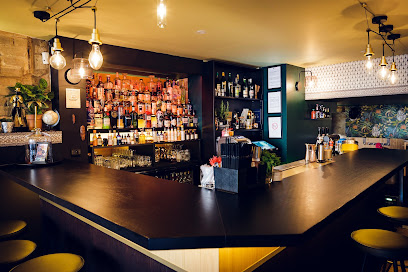
L'Alchimiste
Experience the enchanting atmosphere and creative cocktails at L'Alchimiste, a must-visit bar in Strasbourg's vibrant nightlife scene.
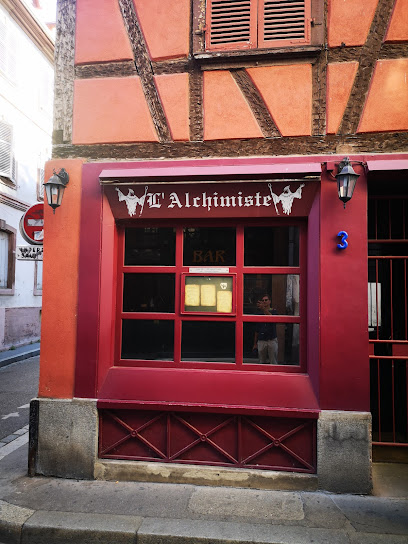
La Mandragore
Discover La Mandragore, a lively bar in Strasbourg offering exquisite cocktails, light bites, and a vibrant atmosphere that captures the city's nightlife.
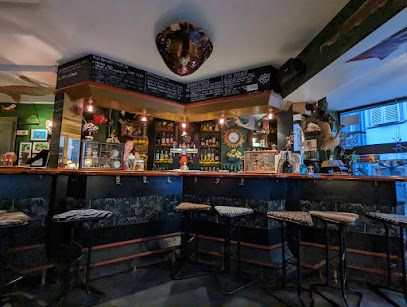
La Perestroïka
Experience the vibrant nightlife of Strasbourg at La Perestroïka, where eclectic drinks and a lively atmosphere await.
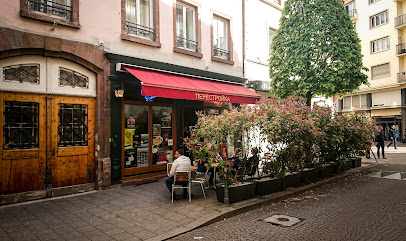
Bar L'Excalibur
Discover Bar L'Excalibur in Strasbourg: a cozy bar with a warm atmosphere, exceptional drinks, and a vibrant local vibe, perfect for unwinding after a day of exploration.
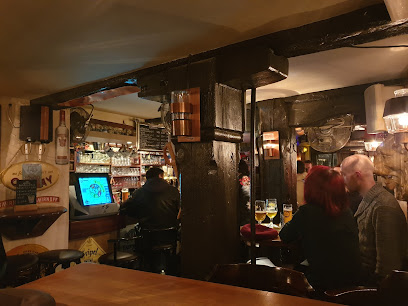
Local Phrases
-
- HelloBonjour
[bon-zhoor] - GoodbyeAu revoir
[oh ruh-vwahr] - YesOui
[wee] - NoNon
[noh] - Please/You're welcomeS'il vous plaît / De rien
[seel voo pleh / duh ryen] - Thank youMerci
[mehr-see] - Excuse me/SorryExcusez-moi / Désolé
[ex-kew-zay mwah / day-zoh-lay] - How are you?Comment ça va?
[ko-mohn sah vah] - Fine. And you?Bien. Et vous?
[byen. ay voo] - Do you speak English?Parlez-vous anglais?
[par-lay voo ahn-glay] - I don't understandJe ne comprends pas
[zhuh nuh kohm-prahn pah]
- HelloBonjour
-
- I'd like to see the menu, pleaseJe voudrais voir le menu, s'il vous plaît
[zhuh voo-dray vwahr luh muh-noo, seel voo pleh] - I don't eat meatJe ne mange pas de viande
[zhuh nuh mahnj pah duh vyand] - Cheers!Santé!
[sahn-tay] - I would like to pay, pleaseJe voudrais payer, s'il vous plaît
[zhuh voo-dray pay-ay, seel voo pleh]
- I'd like to see the menu, pleaseJe voudrais voir le menu, s'il vous plaît
-
- Help!Au secours!
[oh suh-koor] - Go away!Allez-vous en!
[al-lay voo zahn] - Call the Police!Appelez la police!
[ah-peh-lay lah poh-lees] - Call a doctor!Appelez un médecin!
[ah-peh-lay uh mayd-sahn] - I'm lostJe suis perdu
[zhuh swee pair-doo] - I'm illJe suis malade
[zhuh swee mah-lahd]
- Help!Au secours!
-
- I'd like to buy...Je voudrais acheter...
[zhuh voo-dray ash-tay...] - I'm just lookingJe regarde juste
[zhuh ruh-gard zhust] - How much is it?Combien ça coûte?
[kohm-byen sah koot] - That's too expensiveC'est trop cher
[say troh shair] - Can you lower the price?Pouvez-vous baisser le prix?
[poo-vay voo bay-say luh pree]
- I'd like to buy...Je voudrais acheter...
-
- What time is it?Quelle heure est-il?
[kehl er ay eel] - It's one o'clockIl est une heure
[eel ay oon er] - Half past (10)Dix heures et demie
[dee zair ay duh-mee] - MorningMatin
[mah-tahn] - AfternoonAprès-midi
[ah-pray-mee-dee] - EveningSoir
[swahr] - YesterdayHier
[ee-ehr] - TodayAujourd'hui
[oh-zhoor-dwee] - TomorrowDemain
[duh-mahn] - 1Un
[uhn] - 2Deux
[duh] - 3Trois
[twah] - 4Quatre
[kat] - 5Cinq
[sank] - 6Six
[sees] - 7Sept
[set] - 8Huit
[wheat] - 9Neuf
[nuff] - 10Dix
[dee]
- What time is it?Quelle heure est-il?
-
- Where's a/the...?Où est...?
[oo ay] - What's the address?Quelle est l'adresse?
[kehl ay la-dress] - Can you show me (on the map)?Pouvez-vous me montrer (sur la carte)?
[poo-vay voo muh mohn-tray (soor lah kart)] - When's the next (bus)?Quand est le prochain (bus)?
[kahnd ay luh proh-shahn (bus)] - A ticket (to ....)Un billet (pour ....)
[uhn bee-yay (poor)]
- Where's a/the...?Où est...?
History of European Quarter
-
The European Quarter in Strasbourg, known as the Quartier Européen, emerged in the mid-20th century as a symbol of European unity. Following World War II, the area was developed to house various European institutions, reflecting Strasbourg's growing role as a hub for European politics and diplomacy. The establishment of the Council of Europe in 1949 marked the beginning of Strasbourg's transformation into a center for international cooperation.
-
The Council of Europe, headquartered in the European Quarter, has played a crucial role in fostering democratic values, human rights, and the rule of law across Europe. The impressive building, completed in 1977, serves as a testament to the city's commitment to European integration. The presence of this institution has significantly influenced the local economy and international relations, making Strasbourg a pivotal city in the European context.
-
The European Parliament's decision to hold sessions in Strasbourg further solidified the city's importance in European governance. The modern parliamentary complex, inaugurated in 1999, symbolizes the democratic processes of the European Union. This development has not only transformed the architectural landscape of the European Quarter but also brought a vibrant atmosphere to the area, with numerous events and activities centered around EU politics.
-
The European Quarter hosts various cultural events aimed at promoting European integration and understanding. The 'Strasbourg European Fair' and the 'European Cinema Festival' are examples of initiatives that celebrate cultural diversity and foster dialogue among nations. These events highlight the region's commitment to cultural diplomacy and its role as a melting pot of ideas and traditions.
-
The architectural landscape of the European Quarter is marked by modern buildings that reflect the aspirations of a united Europe. Notable structures include the European Parliament building designed by architect Richard Rogers and the Palace of Europe, which houses the Council of Europe. This blend of contemporary design and functional space underscores Strasbourg's identity as a forward-looking city while remaining rooted in its historical significance.
European Quarter Essentials
-
The European Quarter is well connected to other neighborhoods in Strasbourg. You can reach it easily via trams; lines A and D stop at the 'European Parliament' station. For those arriving by train, Strasbourg's main train station (Gare de Strasbourg) is about 10 minutes away by tram. Buses also provide service to the area, with multiple lines operating from various parts of the city.
-
The European Quarter is best explored on foot or by bicycle, as many attractions are within walking distance. Strasbourg has an extensive tram and bus network, with frequent services that make getting around easy and efficient. Bicycles can be rented from local shops or through the city's bike-sharing program, Vélhop. Be sure to follow local cycling rules and use designated bike lanes.
-
The European Quarter is generally safe for tourists, with a low crime rate. However, like in any urban area, it is wise to stay vigilant, particularly in crowded spaces. Areas near the European Parliament are well lit and frequented by tourists, making them safer. Avoid poorly lit streets at night and be cautious of pickpockets in crowded areas.
-
In case of an emergency, dial 112 for police, fire, or medical assistance. The local hospital is located within a few kilometers in the city center. It's advisable to have travel insurance that covers emergencies. For minor health issues, pharmacies are available, and staff generally speak English.
-
Fashion: Do dress comfortably, but avoid overly casual attire in formal settings. Religion: Do respect local customs; if visiting religious sites, dress modestly. Public Transport: Do validate your ticket before boarding and keep it until the end of your journey. Don't eat or drink on public transport. Greetings: Do greet locals with a polite 'Bonjour'. A handshake is common. Eating & Drinking: Do try local Alsatian specialties. Don't leave food uneaten, as it can be seen as wasteful.
-
To experience the European Quarter like a local, visit the Parc de l'Observatoire for a peaceful retreat. Engage with locals at cafés, particularly those near the European Parliament, where you can enjoy the bustling atmosphere. Attend one of the many cultural events held in the area, such as exhibitions or concerts, to immerse yourself in local culture. Don't hesitate to ask locals for recommendations on hidden gems or lesser-known attractions.
Trending Landmarks in European Quarter
-
Cathédrale Notre-Dame-de-Strasbourg
-
Parc de l'Orangerie
-
Barrage Vauban
-
La Petite France
-
Strasbourg Covered Bridges
-
Historical Museum of the City of Strasbourg
-
European Parliament
-
Grande-Île de Strasbourg
-
Place du Château
-
Citadines Apart'hotel Kléber Strasbourg
-
Statue du Général Kléber
-
Statue de Johannes Gutenberg
-
Palace of Europe
Nearby Cities to European Quarter
-
Things To Do in Colmar
-
Things To Do in Freiburg
-
Things To Do in Stuttgart
-
Things To Do in Heidelberg
-
Things To Do in Basel
-
Things To Do in Nancy
-
Things To Do in Remich
-
Things To Do in Zurich
-
Things To Do in Grevenmacher
-
Things To Do in Dudelange
-
Things To Do in Luxembourg City
-
Things To Do in Echternach
-
Things To Do in Lucerne
-
Things To Do in Frankfurt
-
Things To Do in Diekirch










